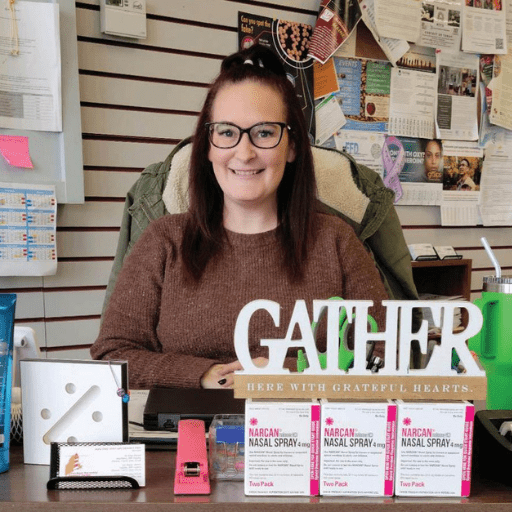Though often thought to be a big city problem, substance use disorder can’t read a map. It can be especially hard to combat in rural communities because of limited resources for prevention, treatment and recovery.
This is the case in Washington County, with two notable exceptions – the Downeast Recovery Support Centers in Calais and Machias. The centers are part of Aroostook Mental Health Services, Inc., more commonly known as AMHC.
Amy Day has been the manager at the DRSC Washington County locations since they opened in fall 2018. As a person in long-term recovery, she always longed to work with individuals living with substance use disorder. “I had always been very vocal about being in recovery,” she said. Being candid and open about her experience brought her desire to work in the recovery community to reality.
“When AMHC secured the funding to open the centers, the program manager called asking me to help build them from the ground up.” He knew Amy’s work ethic and that she had firsthand recovery knowledge.
Every detail of these places shows the care and vision of someone who knew the recovery process. “I like the interactions with people who are just like me. I enjoy being able to help and support someone along their journey.”
Any day at the DRSC, you may see the regulars who come in to hang out a while, people looking for naloxone for themselves or a loved one, someone attending a 12-step meeting, another looking for housing and food, or someone just looking for support and a smile.
“What makes our centers special is there’s nothing else like it available in our area,” said Amy. “Before DRSC, you had to drive almost two hours to get to the closest Recovery Center. Most towns have one blinking light or none at all,” she joked.
Because the centers are so spread out in a sparsely populated area, it is essential to collaborate with other organizations to keep everything running smoothly. For instance, the naloxone they distribute is supplied by Bangor Public Health. Other support comes through a relationship with Healthy Acadia, an organization in Ellsworth working to build healthy communities in Washington and Hancock counties. And they frequently work with one of the county OPTIONS Liaisons. “We work together in order to meet all the needs,” Amy said.
The centers are open from 9 a.m. to 5 p.m. weekdays, with meetings/ events happening on the weekends. Telephone recovery support is always open.
“In such a small town, everyone knows how to reach you on your personal phone or through a Facebook message,” said Amy.
Being in a small, tight-knit community does have disadvantages. “There is a lot of stigma about substance use,” she said. “Our Calais center is on Main Street – some people won’t park in front for fear someone will see their car here and think they need the services.”
Some center activities and events are open to the general public.
“You might be sitting in a Snack and Paint class and someone who has never used a substance is sitting across from someone who is actively using. And maybe someone in recovery is sitting next to them,” said Amy. “Everyone is having a good time and chatting about current events, TV shows, anything. Substance use never comes up.”
The hope is that through these joint interactions, the stigma may lessen. “We’ve worked hard on that through making the sites as much a community center as a recovery center.”
Amy recounted some memories of the centers’ impact. People have told her the naloxone they got at the center saved someone they know. Another said, “I have eight months sober now, because you girls talked me off the edge.”
“I really wish there had been a place like this when I was trying to find recovery because there was nothing around here,” said Amy. “I didn’t even know where or when there was a meeting or what recovery even looked like. Having a space for others just like me, to be able to come and work on themselves while not feeling judged is such a blessing for our tiny community.”
For more information, call the center at (207) 259-6238.
This article was made possible with the support of the OPTIONS program and the Maine Office of Behavioral Health.



